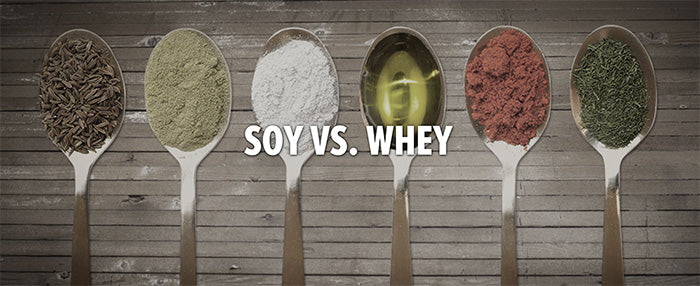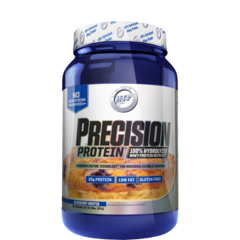
The Ultimate Battle: Hydrolyzed Whey Protein vs. Soy Protein
|
|
Time to read 5 min
Protein is a titan in the nutrition world, and with the ever-rising popularity of fitness and health, the spotlight has naturally fallen upon two heavyweight contenders in the protein supplement ring: hydrolyzed whey and soy protein. In this helpful guide, we'll dive into the nuances that set them apart, backed by science and sprinkled with personal experiences. Whether you're a gym junkie or just trying to pick the best protein for your smoothie, we've got the scoop!
The Breakdown of Proteins: Understanding Hydrolyzed Whey and Soy
Before we pit these two against each other, let's understand what they're made of. Hydrolyzed whey protein is a form of whey protein that's been broken down into smaller pieces for better digestibility and faster absorption. Imagine it as pre-digested protein ready to fuel your muscles post-workout. Soy protein, on the other hand, is derived from soybeans and is a go-to protein source for many vegetarians and vegans.
I remember my switch to hydrolyzed whey after years of soy; the change was like night and day in terms of recovery time. That's the power of a good protein source!
The Amino Acid Arena: Where Muscles Are Made
Hydrolyzed Whey – The Complete Protein Powerhouse
Hydrolyzed whey protein is often hailed as the gold standard when it comes to protein supplements, especially for those aiming to build muscle. Here's why it's considered top-tier:
Full Spectrum of Amino Acids: It boasts all nine essential amino acids, crucial for various bodily functions, especially for repairing and building muscle tissue. These essential building blocks are called 'essential' for a reason—they cannot be produced by our bodies and must be obtained through our diet.
High in Leucine: Leucine is a branched-chain amino acid (BCAA) that is pivotal for muscle protein synthesis. Hydrolyzed whey is particularly high in this crucial amino acid, which can accelerate recovery and growth after workouts.
Rapid Absorption: Due to its hydrolyzed form, where the protein is partially broken down, it's digested and absorbed rapidly. This means it gets to work quickly, replenishing your muscles soon after your training session.
Soy Protein – The Plant-Based Challenger
Soy protein holds its own as a strong contender in the protein supplement market, particularly appealing to those following a plant-based diet.
Complete but Different: Like hydrolyzed whey, soy protein is a complete protein, but its amino acid ratio is slightly varied. This can affect how the body utilizes these amino acids for muscle growth and repair.
Rich in Arginine: Soy is packed with arginine, another amino acid that supports blood flow and, consequently, nutrient delivery to muscles. This can be beneficial for endurance and recovery.
Environmentally Friendly: For those concerned about the environmental impact of their food choices, soy protein is often favored as it's derived from plants, which generally have a lower carbon footprint compared to dairy-based proteins like whey.
Personal Experience and Anecdotes
As someone who has cycled through various protein supplements, my experiences have been quite revealing. After a particularly grueling leg day, I switched from soy to hydrolyzed whey and noticed a marked improvement in my recovery time. This quicker recovery allowed me to hit the gym with the same intensity, session after session.
Similarly, a friend who competes in triathlons made the switch to hydrolyzed whey and reported that it provided the extra stamina needed for rigorous training sessions, which soy protein seemed to lack.
In the battle of hydrolyzed whey vs. soy protein, it's clear that both have their unique advantages. Hydrolyzed whey's complete amino acid profile and rapid absorption rate make it ideal for serious athletes looking to maximize muscle growth and recovery. On the other hand, soy protein is an excellent option for those seeking a complete plant-based protein that still supports muscle maintenance and overall health.
Ultimately, the choice depends on your dietary preferences, environmental concerns, and specific health and fitness goals. Have you experimented with hydrolyzed whey or soy protein? Share your experiences and how they've impacted your training in the comments below. Let's build a community where we can learn from each other's journeys to health and wellness. And if you're looking to give hydrolyzed whey a try, be sure to check out our top-rated, fast-absorbing whey hydrolyzed protein powder for your post-workout needs.
Digestion and Absorption: Getting the Most Out of Your Protein
One of the reasons I switched to hydrolyzed whey was because of its high digestibility. Lactose-sensitive individuals often report fewer issues with hydrolyzed whey due to its processing. Soy protein, while also digestible, can sometimes be problematic for those with soy allergies or sensitivities.
Beyond the Gym: The Holistic Health Benefits
Protein isn't just for building muscle; it has roles in hormonal balance, weight management, and more. Hydrolyzed whey protein may help with insulin-like growth factors, which play a part in muscle and bone health. Soy protein comes with its benefits, including potentially favorable impacts on cholesterol levels.
Ethical and Environmental Considerations
As an environmentally-conscious consumer, I often wrestle with the environmental impact of my protein choices. Soy protein typically has a lower environmental footprint compared to dairy-based proteins, but it's also important to consider the source and how it's cultivated.
Taste and Versatility in Recipes
Taste is subjective, but hydrolyzed whey protein often has a neutral flavor, making it easy to incorporate into recipes without altering the taste significantly. Soy protein can have a distinct flavor, which some might find less palatable or harder to mask in smoothies and shakes.
Making an Informed Choice for Your Goals
Choosing between hydrolyzed whey and soy protein isn't just about the muscle-building benefits; it's about what aligns with your dietary preferences, ethical views, and taste buds. Hydrolyzed whey protein has been my companion through several marathons and muscle-building phases, and its impact has been undeniable.
The Verdict: Picking Your Protein Champion
While hydrolyzed whey might take the crown for quick absorption and muscle synthesis, soy protein stands strong as a plant-based, eco-friendly option. Your choice should be based on your body's response, your dietary needs, and your fitness goals.
To anyone standing at this crossroads, I recommend trying hydrolyzed whey protein for its superior muscle support and rapid absorption. It might just be the game-changer you need for your workouts.
Conclusion: Sharing the Protein Journey
Now that we've explored the hydrolyzed whey vs. soy protein saga, I'm keen to hear your stories. Have you noticed a difference in your training or health by choosing one over the other? Share your experiences and join the conversation in the comments section below.
Remember, the best protein is the one that fits your life and lifts your health. Whether it's hydrolyzed whey protein powder that's caught your eye or the plant-based promise of soy, make your choice with knowledge and confidence. Happy lifting and healthy living!




